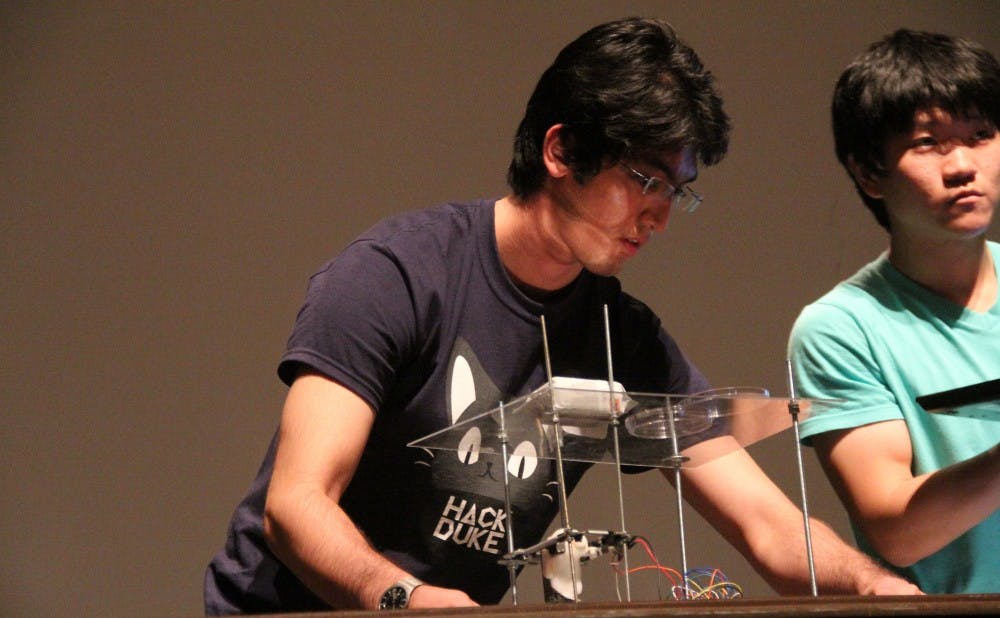HackDuke—the first 24-hour hack-a-thon at Duke—assembled students and individuals from the American tech community earlier this month, resulting in innovative new technology created in just a day.
There were 102 projects and approximately 540 students from around the country competing, said HackDuke founder Dennis Li. Hack Duke bussed students to the University from approximately five other schools, and students from more than 15 schools attended overall. Twenty judges worked in pairs to evaluate the projects according to a grading rubric. The winning project was a battery-powered glove system that can interpret sign language into a text translation and then speech, but participants produced many other promising projects as well.
“When you’re forced to do [a project] in 24 hours, it’s pretty cool to see what you can get done in that time,” junior Tyler Nisonoff said. “I think everyone always exceeds their expectations.”
Duke students developed new technology involving art, gaming and language, for example. Nisonoff—along with junior Chinmay Patwardhan, junior Ryan Toussaint and senior Austin Ness—created an app called Art Genius that won second place. Nisonoff said the app will crowdsource annotations of images, which will both teach people about art history and allow them to explore art in new ways. The team is planning to launch the app over winter break.
“We wanted to modernize [art history] and create a new interface for learning about art and all its intricacies,” Nisonoff said. “The hope is that if you get enough people on the site, people who know a lot about certain images or certain periods of art can add their expert knowledge to the images.”
Another project hoped to modernize the way people around the world play video games by avoiding the computer installation process and lowering fees.
“Computers are changing, but the way we play games hasn’t changed,” senior William Li said. “PC gaming has become very, very resource intensive. Although we do have significantly more hardware space now, the games are taking up more space.”
William Li and his teammates call their cloud gaming project “Sora,” which he said could revolutionize the world of video games. It would allow gamers to pay by the hour instead of per game, and without taking up hard drive space. Li said he has a solid business plan and will compete with the project in the Duke Startup Challenge. He said he is “in it for the long haul.”
First, though, Li must tackle copyright infringement issues because their model is similar to other media-sharing technologies such as Pandora, Spotify and Netflix.
“We don’t have any precedent on [copyright] issues…. It’s a place where you have a whole library of contents for subscription fees,” Li said. “For Pandora at least, they pay the artist based on how many times the song is played. That’s exactly what we’re going to do. I don't see why game publishers will reject that idea.”
Cash prizes were awarded for the top three projects as well as a “novice prize,” but the top 11 projects were presented to the entire group and are featured on Hack Duke’s website. Art Genius was awarded second prize and Sora was one of the top 11.
“We were expecting more softer projects, like a phone app or a website, but instead what we got were a lot of really, really impressive projects that used hardwares,” Dennis Li said.
Dennis Li was pleased with the success of this year’s event and said there are plans for another Hack Duke next year.
“I’m still kind of in shock at the fact that we pulled it off,” Dennis Li said.
Get The Chronicle straight to your inbox
Signup for our weekly newsletter. Cancel at any time.

